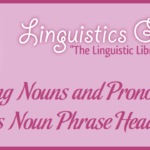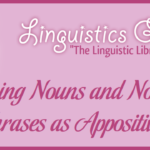Nouns been defined by traditional grammars as words that refer to a person, place, thing, or idea. A noun phrase is a phrase that consists of a noun plus any modifiers, complements, or determiners. Pronouns are words that take the place of nouns and noun phrases. Pronoun is a subcategory of noun.
In grammar, an adjunct adverbial is a word, phrase, or clause that modifies an entire clause by providing additional information about time, place, manner, condition, purpose, reason, result, and concession. Nouns and noun phrases sometimes function as adjunct adverbials. Examples of nouns and noun phrases as adjunct adverbials include the following:
- Please mow the lawn today. (noun)
- Tomorrow we head out to Europe. (noun)
- My daughter starts school Monday. (noun)
- You should brush your teeth every evening. (noun phrase)
- Yesterday morning the puppy woke up early. (noun phrase)
- I could not fall asleep Friday night. (noun phrase)
Noun as Adjunct Adverbial
Noun Phrase as Adjunct Adverbial
References
Brinton, Laurel J. & Donna M. Brinton. 2010. The linguistic structure of Modern English, 2nd edn. Amsterdam: John Benjamins Publishing Company.
Hopper, Paul J. 1999. A short course in grammar. New York: W. W. Norton & Company.
Huddleston, Rodney. 1984. Introduction to the grammar of English. Cambridge: Cambridge University Press.





